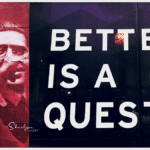I love getting questions from HR Bartender readers. This one was a bit challenging.
What is the link between personal branding and impression management? I am working on a research project and need to know the connection between them. I hope you could answer my question. Thank You.
I must admit, I had not heard of the term “impression management” before, so I Googled it and found that Impression management, first conceptualized by Erving Goffman in 1959, is a conscious or subconscious process in which people attempt to influence the perceptions of others about a person, object, or event. They do so by regulating and controlling information in social interaction. An example would be in a sport such as football. A player wants to highlight themselves in the best possible way, because there are college scouts watching. They would have a flashy haircut, and try to perform their best to show off their skills. Their actions are not focused toward winning the game as much as getting the attention of the college scouts (so they can get a scholarship.)

On the other hand, we’ve talked about personal branding before on HR Bartender. Personal branding is the practice of people marketing themselves and their careers similar to the way companies manage their consumer brand. The term is thought to have been first used and discussed in a 1997 Fast Company article by Tom Peters titled “The Brand Called You.” Personal branding is essentially the ongoing process of creating an image or impression in the mind of others about an individual, group, or organization. David McNally and Karl Speak, authors of “Be Your Own Brand” define personal brand in this way, “Your brand is a perception or emotion, maintained by somebody other than you, that describes the total experience of having a relationship with you.”
I can see how these two concepts are very similar. Both personal branding and impression management are processes, designed to influence the way others think about a person, place, or thing.
Where they appear to be different – at least to me – was in who drove the influence. The individual seems to control impression management and the community appears to control personal branding.
The other aspect that is hard to determine is the prescribed order of effectiveness. For example, a person’s efforts at impression management can impact their personal brand. If you do something good, the positive aspects of your personal brand get stronger. If you do something not-so-good, well…it impacts your personal brand negatively. But I can also see how an individual’s perceptions of their personal brand could lead them to take steps in impression management. Such as “I need to improve my personal brand in this area, so I’m going to do this…” Both on the surface, seem logical so the order could be interchangeable.
The big takeaways for me were:
- How I perceive myself is important and I need to take steps to maintain self-awareness.
- The accuracy (or inaccuracy) of my self-awareness could drive successful (or unsuccessful) decision-making when it comes to my personal and professional life.
- Of equal importance is the need to solicit feedback from others and their perceptions. They can open me to blind spots in my thinking.
The real connection between impression management and personal branding is self-awareness. We need to learn how to become self-aware and maintain a level of self-awareness, even when everything around us is changing.
Image captured by Sharlyn Lauby at the Herman Miller Aeron rollout in Miami, FL
0







Ramkumar Yaragarla says
Hi Sharlyn, Great post. In my opinion, I think, impression management can also deal with managing others perception on you. In a way, perception management.
I agree with you, Self awareness is a very big factor. One needs to be aware of not only his/her emotions but also how they carry themselves and their own strengths and weakness.
I feel, there is a slight difference between branding and impression management.
Branding would be more towards, showing one-self as a invaluable asset, a knowledgeable colleague and sort of indispensable. Where others can look forward to and be an example for others.
This is just my opinion. I liked reading through your posts, Sharlyn. Enjoyed it. Thank you. Cheers, Ramkumar
Sharlyn Lauby says
Thanks for sharing your thoughts Ramkumar.